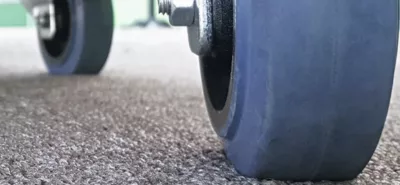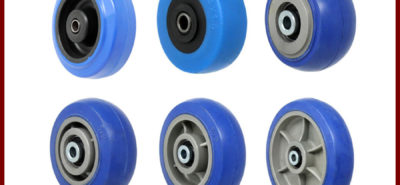Steel & Iron Caster Wheels: Pros and Cons

When looking for heavy duty casters with brakes, some of your best options are steel or iron. These provide the strength required to hold heavy loads and have the most robust braking mechanisms.
One of the big decisions you’ll need to make is whether using metal is the best option for your specific job. There are many other alternatives with different pros and cons that could offer advantages over metal casters.
Detailed below are the pros and cons of steel casters and iron casters to help you decide when you’re considering adding casters to your equipment.
Metal Casters Pros
Carefully consider whether the pros of metal casters outweigh the cons based on your requirements and your environment. Picking the best casters can save you time, money, and potential injury down the line.
Easy to Move
One of the significant advantages of metal casters is that the initial force to get them moving is minimal. They keep moving with that initial force through minimum effort, limiting your requirements to push or struggle with the equipment you’re moving.
As the load increases on the casters, the ease of movement increases; however, if you’re working with heavy duty casters, it’s easy to stop the equipment and switch the breaks on with no movement.
Your only limitation may be wet environments on a slope, which metal casters (even with brakes) can still slide down, which, combined with the heavy loads, may make for a dangerous situation for workers.
Extremely Durable
In most situations, metal casters are extremely durable; they can handle rough terrain and all kinds of flooring. This is especially true for steel casters which also can handle shock loading.
Shock loading is where you’re dropping weight into the equipment, and the steel casters won’t crack or break from the “shock”.
The only environmental factor that can generally cause damage to metal casters is moisture which can cause corrosion to the casters unless you have specific casters that are treated for moisture resistance.
Moisture doesn’t just mean water either, as any kind of moisture, including from chemicals, can cause damage. But you can get industrial-grade stainless steel casters that are corrosion and heat resistant to handle the toughest environments with the heaviest load capacities.
High Load Capacity
Metal casters are the best option when the load capacity is your primary concern; they can take more load than any other type of caster, so are optimal to be used if that is the primary concern for your project.
It’s best to ensure you use heavy-duty casters with breaks for extremely heavy loads so that you can secure the load in place; otherwise, you risk damage and injury.
You can increase overall load capacity by adding more heavy-duty casters to your equipment. However, ensure that you have some safety room on how much weight you’re carrying, as movement or shock loading can cause weight to temporarily shift to a specific caster and cause damage.
Handle High Temperatures
Metal casters are superior options for extreme temperature changes, either cold or hot. Many other caster materials can be damaged by temperature fluctuations or in extreme temperatures.
The ability to handle high and low temperatures makes metal ideal in those environments, such as freezers for meat processing plants or environments dealing with extremely high temperatures.
Many alternative materials used for casters may handle temperatures up to 350F – 470F, while metal casters can easily handle temperatures of 1,600F and above.
Checking the temperature rating of your casters is extremely important, as some materials may just become flat and load capacity starts to drop, while at certain temperatures, casters may melt.
Metal Casters Cons
Metal casters have some cons that make them unsuitable in various situations; if you’re not looking for extremely high load capacity or extreme temperatures, then metal might not be for you.
High Cost
Metal casters are often the most expensive options due to the difficulty in manufacturing them and the material costs. The benefits you get from the metal casters are the only reason to pick them and pay the higher prices.
If you’re comparing metal to polyurethane casters and the pros and cons equal out, then polyurethane will be a cheap option that gives some unique advantages, and they provide heavy duty casters with brakes the same as metal casters do.
They Are Loud
Metal casters create the most noise in any environment; size, load, and speed increase the noise, which can be a significant problem for employees once noise levels go above 90dB.
If you have many employees in the area and the noise goes above 90dB, that becomes a health and safety concern that could cause you problems, including additional costs.
High Vibration
Metal casters have poor shock absorption, so while they’re easy to move, any kind of shock or resistance is felt by the cart operator through strong vibrations, making them highly uncomfortable and unpleasant to operate on anything other than flat surfaces with no bumps or debris.
Manual operation of carts that use metal casters on rough surfaces can cause injury and frustration to workers. It’s also not ideal for transporting fragile equipment or supplies.
Hard on Floors
Metal casters are not ideal for many flooring types as they can heavily damage the floor, whether they’re leaving groves or stripping the top layer of the flooring. They can even start to cut into the floor and leave holes.
If protecting your flooring is a high priority, then metal won’t be a good option. Instead, you should look at polyurethane casters that can handle heavy loads and protect flooring more than steel or iron casters.
Are Steel Casters or Iron Casters Better?
When looking for casters that appear superior for your project, your two primary options will be steel casters or iron casters.
- Steel casters can generally handle up to 30% more load capacity
- Steel casters can handle shock loading much better than iron casters
- Iron casters are 30-50% cheaper
- Iron casters are easy to machine if modifications are needed
If you have questions, we recommend you contact our team of specialists who can help you make the best choice in resolving your caster needs.




